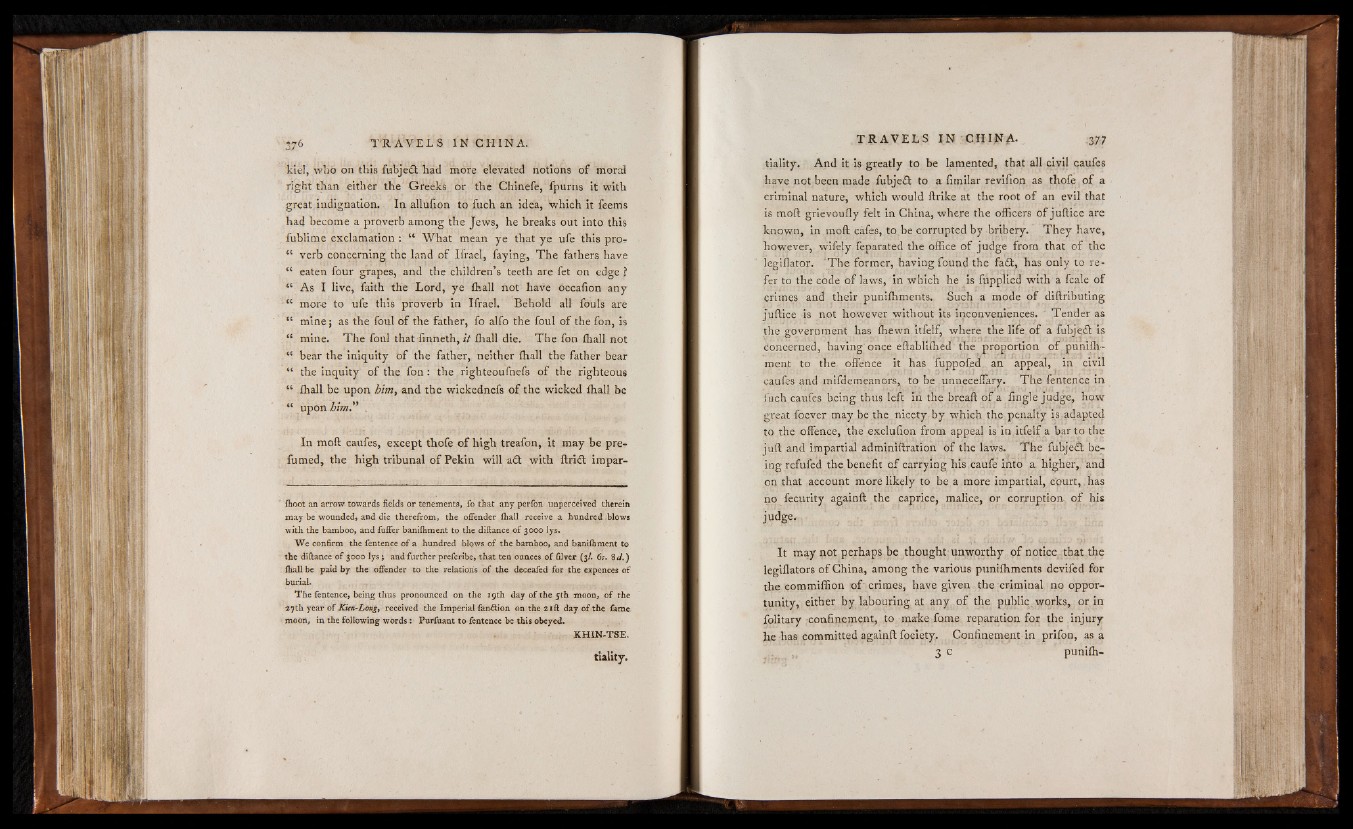
kiel, who on this fubje£t had more elevated notions o f moral
right than either the Greeks or the Chinefe, fpurns it with
great indignation. In allufion to fuch an idea, which it feems
had become a proverb among the Jews, he breaks out into this
fublime exclamation : “ What mean ye that ye ufe this pro-
“ verb concerning the land o f Ifrael, faying, The fathers have
“ eaten four grapes, and the children’s teeth are fet on edge I
“ As I live, faith the Lord, ye ihall not have occafion any
more to ufe this proverb in Ifrael. Behold all fouls are
“ mine; as the foul o f the father, fo alfo the foul o f the fon, is
“ mine. The foul that finneth, it lhall die. The fon ihall not
“ bear the iniquity o f the father, neither ihall the father bear
“ the inquity o f the fon : the righteoufnefs o f the righteous
“ ihall be upon him, and the wickednefs o f the wicked ihall be
“ upon him." .
In moft caufes, except thofe o f high treafon, it may be prefumed,
the high tribunal o f Pekin will a£t with ftriit impar-
{hoot an arrow towards fields or tenements, fo that any perfon unperceived therein
may be wounded» and die therefrom, the offender ihall receive a hundred .blows
with the bamboo, and iiiffer baniihment to the diftance.-of 3000 lys»
We confirm the fentence o f a hundred blows o f the bamboo, and baniihment to
the diftance o f 3000 lys \ and further prefcribe, that ten ounces o f filver (3/. 6s. SJ.)
ihall be paid by the offender to the relations o f the deceafed for the expences o f
burial.
The fentence, being thus pronounced on the 19th day o f the 5th moon, o f the
27th year o f Kien-Long, received the Imperial fan&ion on the 2 ill day o f the fame
moon, in the following words: Purfuant to fentence be this obeyed.
KH IN -T SE .
tiality. And it is greatly to be lamented, that all civil caufes
have not been made fubjedt to a fitnilar revifion as thofe.of a
criminal nature, which would ftrike at the root o f an evil that
is moft grievouily felt in China, where the officers o f juftice are
known, in moft cafes, to be corrupted by bribery. T he y have,
however, wifely feparated the office o f judge from that o f the
legiflator. The former, having found the fa il, has only to refer
to the code o f laws, in which he is fupplied with a fcale o f
crimes and their puniffiments. Such a mode o f diftributing
juftice is not however without its inconveniences. Tender as
the government has ffiewn itfelf, where the life o f a fubjeit is
¿oncerned, having once eftabliihed the proportion o f puniffi-
ment to the offence it has fuppofed an appeal, in civil
caufes and mifdemeanors, to be unneceffary. The fentence in
fuch caufes being thus left m the breaft of.a frngle judge,' how
great foever may be the nicety by which the penalty is .adapted
to the offence, the exclufion from appeal is" in itfelf a bar to the
juft and impartial administration o f the laws. The fubjedt being
refufed the benefit o f carrying his cauie into a higher, and
on that account more likely to be a more impartial, court, , has
no fecurity againft the caprice, malice, or corruption o f his
judge.
It may not perhaps be thought unworthy o f notice, that the
legiflators o f China, among the various punilhments devifed for
the commiffion of'crimes, have given the criminal no opportunity,
either by labouring at any o f the public, works, or in
folitary confinement, to make fame reparation for the injury
he has committed againft fociety. . Confinement in prifon, as a
3 c punilh